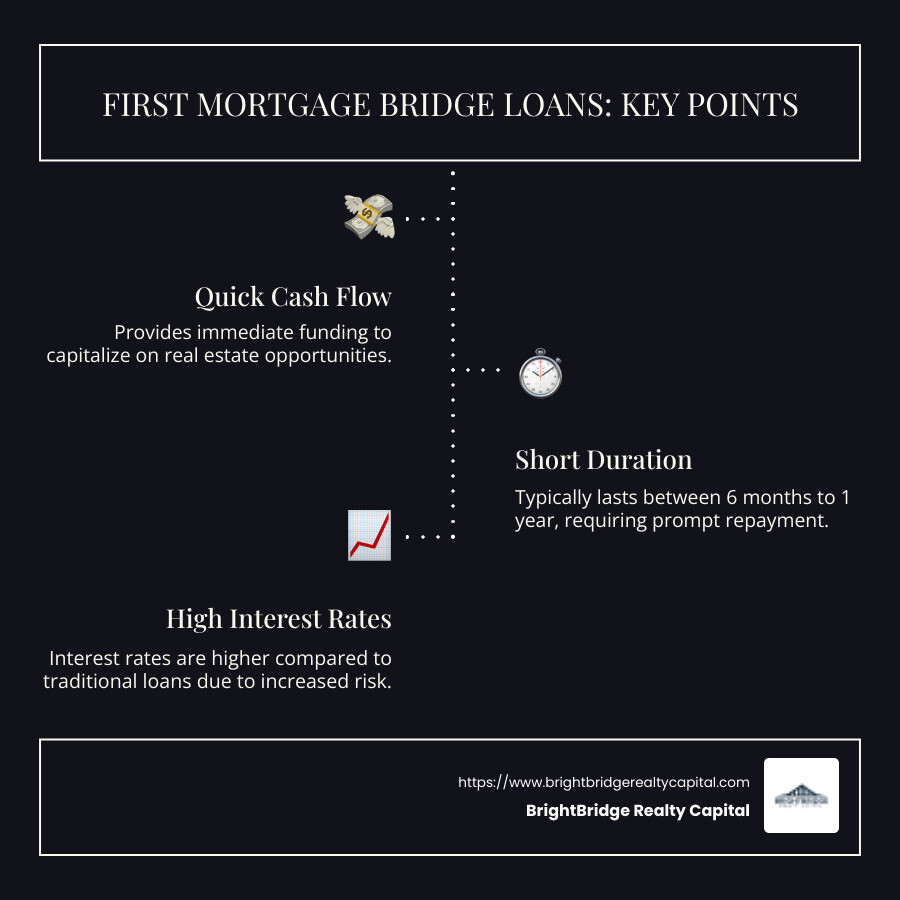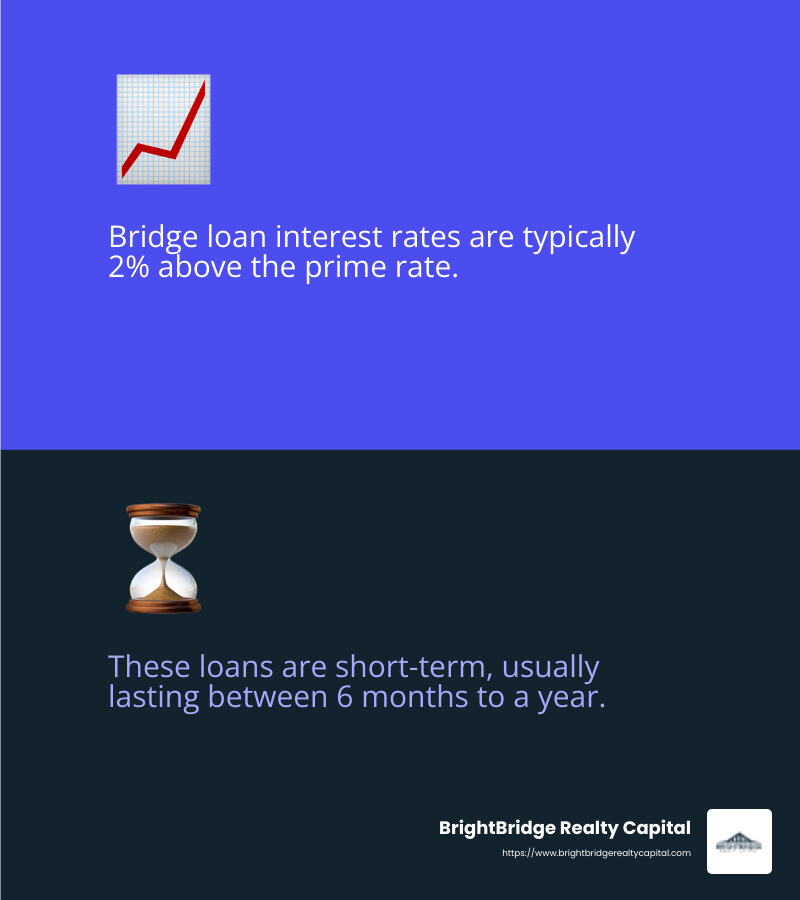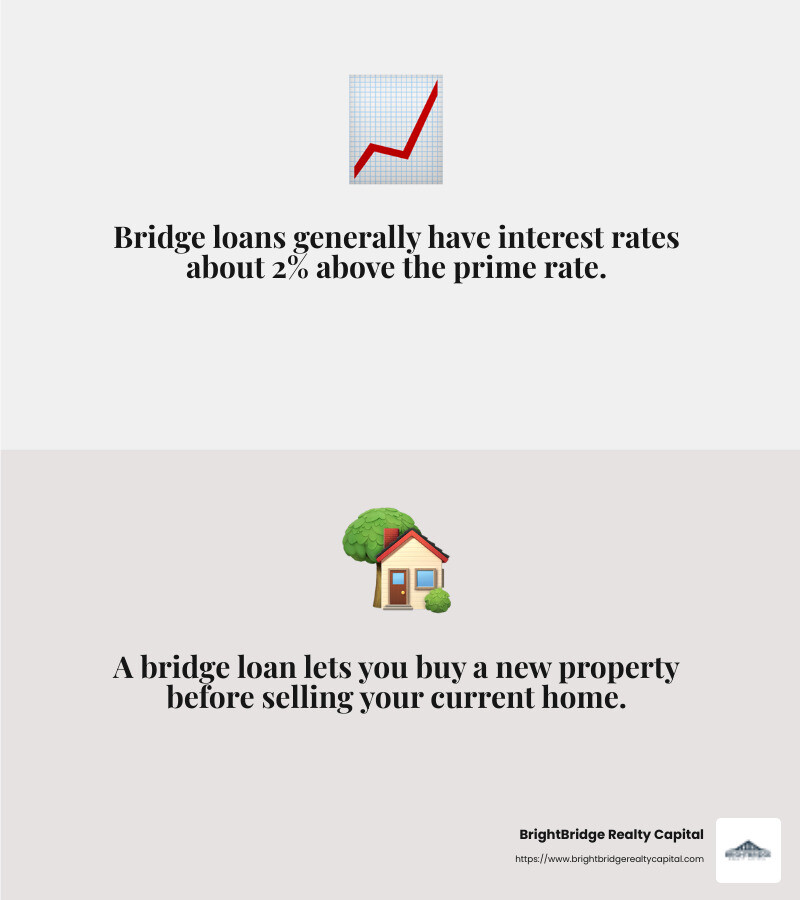First Mortgage Bridge Loans: Bridging Your Way to a New Home

First mortgage bridge loans are a powerful financial tool that can play a crucial role in real estate transactions, especially for investors seeking swift, transitional financing solutions. These short-term loans are designed to "bridge the gap" during periods of transition, helping real estate investors capitalize on timely opportunities without the typical wait associated with traditional financing.
- Purpose: Provide quick cash flow for real estate deals before long-term financing is secured.
- Duration: Typically 6 months to 1 year.
- Interest: Generally higher rates than traditional loans due to the increased risk and shorter term.
- Collateral: Secured against the borrower’s current property.
In a real estate market, where opportunities can slip away quickly, first mortgage bridge loans offer investors the flexibility and speed required to stay competitive. By leveraging the equity in a current property, these loans facilitate the purchase of new investments or renovations, ensuring that opportunities aren't missed due to financing delays.

First mortgage bridge loans vocabulary:
Understanding First Mortgage Bridge Loans
First mortgage bridge loans are essential tools in real estate for those in need of short-term financing. They provide a crucial cash flow solution, allowing investors to act quickly in a competitive market.
Short-Term Financing
First mortgage bridge loans are designed to be temporary, typically lasting from 6 months to a year. This short-term nature is ideal for bridging the gap between selling a property and securing permanent financing.
Cash Flow
The primary advantage of these loans is the immediate cash flow they provide. Imagine you're an investor with an eye on a promising property, but your funds are tied up in another investment. A bridge loan can provide the funds needed to seize the opportunity without waiting for your current property to sell.
Equity
These loans often rely on the equity in your existing property. This means that the more equity you have, the more you can potentially borrow. It's a way of leveraging your current assets to expand your real estate portfolio.
Secured Loans
First mortgage bridge loans are secured by the borrower's current property. This security reduces the lender's risk, but it also means that if you can't repay the loan, you risk losing your property. Therefore, it's important to have a plan for repayment, whether that's selling the current property or securing long-term financing.
By understanding the key components of first mortgage bridge loans, you can better steer the fast-moving world of real estate investments. These loans offer a unique blend of speed, flexibility, and leverage, making them an attractive option for savvy investors.
How First Mortgage Bridge Loans Work
First mortgage bridge loans are powerful tools for navigating real estate transactions. Their structure is designed to accommodate the unique needs of property buyers and sellers during transitional periods.
Loan Duration
These loans are short-term, typically spanning from 6 months to a year. This brief duration is intentional, as the primary goal is to provide temporary funding. Once your old property sells or you secure long-term financing, the bridge loan is repaid.
Repayment Terms
Repayment terms for bridge loans can vary widely. Some lenders might require monthly payments, while others might allow for a lump sum repayment at the end of the loan term. It's essential to understand these terms upfront to ensure they align with your financial situation.
Interest Rates
Interest rates on first mortgage bridge loans are generally higher than traditional loans, often about 2% above the prime rate. This reflects the short-term nature and increased risk for lenders. While the rates are higher, the trade-off is quick access to funds when you need them most.
Collateral
Collateral for these loans is usually the borrower's current property. This means that the property acts as security for the loan. If the loan isn't repaid, the lender can take possession of the property. This makes it crucial to have a solid repayment strategy, whether through the sale of the property or alternative financing.

First mortgage bridge loans offer a strategic advantage in real estate by providing fast, flexible funding. However, understanding their mechanics—like loan duration, repayment terms, interest rates, and collateral—is crucial for making informed decisions.
This knowledge equips you to leverage these loans effectively, ensuring you can seize opportunities in the real estate market.

Pros and Cons of First Mortgage Bridge Loans
First mortgage bridge loans can be a valuable tool in the real estate market, but like any financial product, they come with their own set of advantages and disadvantages. Let's break them down:
Advantages
Quick Access to Cash: These loans provide immediate funds, enabling homeowners to purchase a new property before selling their existing one. This can be crucial in competitive housing markets where timing is everything.
Flexibility: Borrowers can use their current home equity as collateral, which allows them to make offers on new homes without contingencies regarding the sale of their current property.
Interest-Only Payments: Some bridge loans offer the option to make interest-only payments during the loan term, easing the financial burden until the existing home is sold or other financing is secured.
Larger Down Payment: By using the equity in your current home, you can make a larger down payment on your new home, potentially securing better mortgage terms.
Disadvantages
High Interest Rates: One of the most notable drawbacks is the higher interest rates. Typically, these rates are about 2% above the prime rate, making them more expensive than traditional loans. This reflects the short-term nature and increased risk for lenders.
Equity Requirements: To qualify for a bridge loan, you need substantial equity in your current home. This can be a barrier for homeowners who have not built up enough equity.
Multiple Mortgage Payments: You might end up paying up to three mortgage payments at once—your original mortgage, the bridge loan, and the new mortgage—until your current home sells. This can put a strain on your finances.
Foreclosure Risk: If you fail to sell your home or secure long-term financing before the bridge loan term ends, you risk foreclosure on your property. This makes it essential to have a solid plan for repayment.
Conclusion
First mortgage bridge loans offer a strategic advantage by providing quick access to funds, but they also come with higher costs and risks. Understanding these pros and cons is essential for making informed decisions and effectively utilizing these loans in your real estate endeavors.
Next, let's explore how BrightBridge Realty Capital can provide custom solutions to meet your unique financing needs.
Custom Solutions with BrightBridge Realty Capital
When it comes to first mortgage bridge loans, BrightBridge Realty Capital stands out with its custom financing solutions designed to meet the unique needs of each client.
Customized Financing
At BrightBridge, we understand that no two clients are the same. That's why we offer customized financing options that align with your individual circumstances and goals. Whether you're purchasing a new home, investing in real estate, or expanding your property portfolio, we provide solutions that fit your specific needs.
Fast Closings
Time is often of the essence in real estate transactions. That's why we prioritize fast closings. Our streamlined processes ensure that you receive the funds you need promptly, often within a week. This speed can be crucial in competitive markets where opportunities arise and disappear quickly.
Direct Lending
As a direct lender, BrightBridge Realty Capital cuts out the middleman, offering competitive rates and a smoother transaction process. This approach not only saves you money but also provides a more transparent lending experience. You deal directly with us, ensuring clear communication and efficient service.
Client-Focused Approach
Our client-focused approach means we are dedicated to supporting you every step of the way. From the initial application to the final payoff, our team of experts is committed to providing guidance and support. We work closely with you to ensure that our financing solutions align with your goals and financial situation.
At BrightBridge Realty Capital, we don't just offer loans; we offer partnerships. Our goal is to empower you with the right financial tools to achieve your real estate ambitions.
Next, we'll address some frequently asked questions about first mortgage bridge loans to help you understand the requirements, differences from traditional loans, and potential risks.
Frequently Asked Questions about First Mortgage Bridge Loans
What are the typical requirements for a first mortgage bridge loan?
To qualify for a first mortgage bridge loan, lenders typically look at three main factors: your credit score, debt-to-income (DTI) ratio, and loan-to-value (LTV) ratio.
Credit Score: Most lenders prefer a credit score of 740 or higher. A strong credit history reassures lenders that you're a reliable borrower.
Debt-to-Income Ratio: A DTI below 50% is often required. This ratio helps lenders assess your ability to manage monthly payments alongside existing debts.
Loan-to-Value Ratio: You'll generally need at least 20% equity in your current home, meaning you can borrow up to 80% of the home's value.
How do first mortgage bridge loans differ from traditional loans?
First mortgage bridge loans and traditional loans differ in several key ways:
Application Process: Bridge loans often have a faster approval process to accommodate quick real estate transactions. Traditional loans may take longer due to more extensive underwriting.
Interest Rates: Bridge loans usually come with higher interest rates—often about 2% above the prime rate—because they are short-term and carry more risk.
Loan Terms: Bridge loans are typically short-term, lasting 6 months to 1 year, while traditional mortgages can extend up to 30 years.
What are the risks associated with first mortgage bridge loans?
While first mortgage bridge loans can be helpful, there are risks to consider:
Foreclosure Risk: Since these loans are secured by your current property, failure to make payments can lead to foreclosure.
Financial Stress: Managing two mortgages simultaneously can be financially straining, especially if your home doesn't sell quickly.
Market Conditions: If the real estate market slows, selling your home might take longer than expected, increasing financial pressure.
Understanding these factors can help you make an informed decision about whether a first mortgage bridge loan is right for you.
Conclusion
Navigating real estate financing can be challenging. That's why BrightBridge Realty Capital is here to make it easier with our customized financing solutions. We understand that every real estate transaction is unique, and we tailor our services to meet your specific needs.
One of the standout features of our service is our ability to offer fast closings. We know that time is often of the essence in real estate deals, and our process is designed to be quick and efficient. In fact, we often close deals within a week, ensuring you can seize opportunities as they arise.
Moreover, our direct lending approach means there are no intermediaries to slow down the process or inflate costs. This not only speeds up the transaction but also allows us to offer competitive rates that are hard to beat.
Whether you're flipping properties, building new constructions, or expanding your rental portfolio, BrightBridge Realty Capital is your partner in achieving your real estate goals. Our nationwide reach and expertise ensure that you have access to the capital you need, no matter where your investment properties are located.
Ready to explore how our solutions can help you? Learn more about our services and start your journey with us today.


